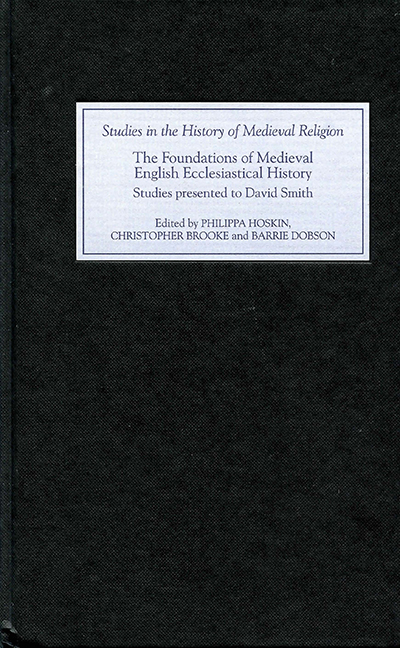Book contents
- Frontmatter
- Contents
- List of Contributors
- Acknowledgements
- Abbreviations
- Miscellaneous Frontmatter
- David Smith: the Scholar
- ‘The archivist is not and ought not to be a historian.’ David Smith and the Borthwick Institute
- Why Forge Episcopal Acta? Preliminary Observations on the Forged Charters in the English Episcopal Acta Series
- Pastors and Masters: the Beneficed Clergy of North-East Lincolnshire, 1290–1340
- The Convent and the Community: Cause Papers as a Source for Monastic History
- Patriarchy and Patrimony: Investing in the Medieval College
- ‘Above all these Charity’: the Career of Walter Suffield, Bishop of Norwich, 1244–57
- The Law of Charity and the English Ecclesiastical Courts
- Continuing Service: the Episcopal Households of Thirteenth-Century Durham
- The Acta of English Rural Deans in the later Twelfth and early Thirteenth Centuries
- The Court of Arches and the Bishop of Salisbury
- Bishops’ Registers and Political History: a Neglected Resource
- The Vatican Archives, the Papal Registers and Great Britain and Ireland: the Foundations of Historical Research
- Bibliography of the Writings of David Smith
- Index
- Tabula Gratulatoria
Pastors and Masters: the Beneficed Clergy of North-East Lincolnshire, 1290–1340
Published online by Cambridge University Press: 24 October 2017
- Frontmatter
- Contents
- List of Contributors
- Acknowledgements
- Abbreviations
- Miscellaneous Frontmatter
- David Smith: the Scholar
- ‘The archivist is not and ought not to be a historian.’ David Smith and the Borthwick Institute
- Why Forge Episcopal Acta? Preliminary Observations on the Forged Charters in the English Episcopal Acta Series
- Pastors and Masters: the Beneficed Clergy of North-East Lincolnshire, 1290–1340
- The Convent and the Community: Cause Papers as a Source for Monastic History
- Patriarchy and Patrimony: Investing in the Medieval College
- ‘Above all these Charity’: the Career of Walter Suffield, Bishop of Norwich, 1244–57
- The Law of Charity and the English Ecclesiastical Courts
- Continuing Service: the Episcopal Households of Thirteenth-Century Durham
- The Acta of English Rural Deans in the later Twelfth and early Thirteenth Centuries
- The Court of Arches and the Bishop of Salisbury
- Bishops’ Registers and Political History: a Neglected Resource
- The Vatican Archives, the Papal Registers and Great Britain and Ireland: the Foundations of Historical Research
- Bibliography of the Writings of David Smith
- Index
- Tabula Gratulatoria
Summary
The little nunnery of Greenfield lay a few miles to the north-west of the Lincolnshire town of Alford. Carrying out a visitation here in 1293, Bishop Oliver Sutton found that the prioress, Christine of Owmby, was ill-suited for either the spiritual or the temporal rule of the house. Shortly afterwards, he issued a commission to the prior of Markby and to the rector of Aylesby, Master Simon de Luda, to examine and confirm the next prioress to be elected by the convent. Events did not altogether proceed as planned, however, because Master Simon was ill and unable to travel to Greenfield. To avoid prolonging the vacancy therefore, the prior, with the prioress-elect Elizabeth of Harrington, decided that if the rector could not come to them, they would go to him, and the examination duly took place, in Master Simon's presence, in Aylesby church.
On the surface, this might seem to be a purely routine item of diocesan business. There is, however, an element of what Sherlock Holmes might have called ‘the curious incident of the dog in the night-time’. The popular view of the beneficed clergy of late medieval England is that they were ill-educated absentees who abandoned their parishioners for the easier life of a chantry or a prebend. Yet here we find an incumbent who was educated, resident and, despite his temporary indisposition, active. This is a long way from Langland:
I haue be prest and persoun passynge thretti winter,
Hete can I neither solfe ne singe ne seyntes lyues rede;
But I can fynde in a felde or in a fourlonge an hare,
Better yan in beatus vir or in beati omnes
Construe oon clause wel and kenne it to my parochienes.
This portrait of ‘Parson Sloth’ encouraged the belief, at one time widely accepted, that the average incumbent was lazy and ignorant, neglecting his spiritual duties in favour of his rhymes of Robin Hood and his love of the chase. Three complaints in particular recur constantly: the parish clergy were ill–educated, they failed to proceed to the priesthood, preferring to remain in minor orders, and they were absentees, enjoying the fruits of their livings but not performing their spiritual duties in person.
- Type
- Chapter
- Information
- The Foundations of Medieval English Ecclesiastical HistoryStudies Presented to David Smith, pp. 40 - 62Publisher: Boydell & BrewerPrint publication year: 2005

